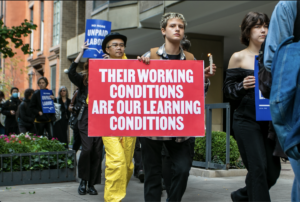Galileo’s Middle Finger
As is true of any human endeavor, the pursuit of science cannot be entirely objective — ideology and economics inevitably play roles. Penguin Press
Penguin Press
Penguin Press
|
To see long excerpts from “Galileo’s Middle Finger” at Google Books, click here. |
“Galileo’s Middle Finger: Heretics, Activists, and the Search for Justice in Science” A book by Alice Dreger
Science historian Alice Dreger recalls being 25 years old and in graduate school when she first learned that not all humans are readily identifiable as male or female. Years later she was outraged to learn that a childhood acquaintance had been informed by neither his parents nor his physician that he was born with ambiguous genitalia. “This was exactly what I was then documenting in my work,” she writes in her book, “Galileo’s Middle Finger”: “how babies born with sex anomalies were ‘fixed’ and then promptly swaddled in shame, secrecy, and lies.”
Dreger was studying hermaphroditism at the time, focusing in particular on what men of science in late-19th-century Britain and France made of the condition. Actually, Dreger reports, they didn’t make much of it, as biopsies of gonadal tissue were not yet available, and it was therefore next to impossible to classify people as true hermaphrodites unless they were castrated or dead. By the mid-1950s, what we now call intersex was easily diagnosed and typically treated with sex-normalizing surgeries, hormone treatments and sometimes lies — the very tactics Dreger recalls being deployed on her childhood buddy as well as on many “really angry intersex adults who discovered that they had been harmed by the medical care meant to ‘save’ them.”
In the early 1990s, a core group of these angry people coalesced into a movement that Dreger eagerly joined, as she was convinced that “evidence based medicine” indicated that many of those born intersex were better left alone. She has come to advocate something similar for conjoined twins, who she argues are surgically sundered more often out of “adult sexual fear” (meaning fear that they will — or won’t — have sex with each other or with others) than from medical necessity. From this, she goes on to promote the idea, made popular by psychologist J. Michael Bailey, that male-to-female transitions are less about gender identity than about erotic expression — that is, that men choose to become physically female either because they find it the best way to attract other men or because they are sexually aroused by the very prospect of doing so.
Dreger unites her stances on these seemingly disparate issues with a theme: She claims that her positions are all politically incorrect and therefore suspect to the scientific mainstream, as Galileo’s were to the church. Her larger theme is that, in science, evidence has given way to ideology and that scientists bold enough to buck the status quo are all too often marginalized or even banished. She sees herself as a crusader for intellectual freedom, following the science wherever it leads, as opposed to what she describes as the standard academic practice of stifling uncomfortable truths. She writes, “Only people like us, with insane amounts of privilege, could ever think it was a good idea to decide what is right before we even know what is true.”
This is an excellent point, of course, but one that might have been better supported with examples other than those she happened to light upon. For in her defense of what she calls “evidence based activism,” she sometimes appears not so much politically incorrect as simply incorrect.
Dreger’s long and gossip-packed section on transgender, for example, mounts a shrill defense of Bailey, her Northwestern University colleague, while making light of the fact that his views — as espoused in his book “The Man Who Would Be Queen” — are not bolstered by carefully cited research. While claiming to put truth before politics, Dreger overlooks actual scientific evidence, such as brain scans indicating that, regardless of their chromosomes, gonads and sex hormones, some men and women identify with the sex that the gender-affected parts of their brains make them believe themselves to be. Hence, it’s likely that many, if not most, of Bailey’s detractors were motivated by evidence-based conviction, not political correctness.Dreger is far more convincing — and her prose far less strained — later in the book, when she reprises the oft-told story of Napoleon Chagnon, the swashbuckling anthropologist notorious for his controversial studies of the Yanomamo, an indigenous, village-dwelling people scattered across the boundary of Brazil and Venezuela. Chagnon lived with the Yanomamo, learned their language and amassed a treasure trove of data on their rough-and-tumble lifestyle, including the custom of men bludgeoning other men to death in order to steal their wives. He noted that such bad behavior appeared to have a payoff — Yanomamo who killed had roughly three times as many children as those who didn’t. By Darwinian standards, then, an inclination to murder was a plus, as it seemed to signal reproductive fitness.
Chagnon’s theory was not well received by proponents of the gentle-native narrative, especially since he made the Yanomamo a kind of portal leading deep into the heart of human nature. Some scholars worried that his characterizations might be used to cast indigenous peoples as ruthless savages, unworthy of future study. Critics’ fires were further stoked by a popular book, “Darkness in El Dorado,” claiming that Chagnon and his collaborator, geneticist James V. Neel, had falsified data and, among other atrocities, exacerbated a lethal measles outbreak by knowingly depriving the Yanomamö of a vaccine. (That charge was later proved groundless.) A seminar on the controversy, sponsored by the American Anthropological Association, degenerated into a furious and sometimes hysterical bout of accusations and charges, very few of them supported by data or evidence.
Chagnon may have been a victim of political correctness, as it’s possible that some opponents feared that his findings would put their own research at risk. Still, prone to making racist and sexist comments as well as exaggerated claims, he is less than a perfect poster boy for Dreger’s argument that political correctness per se has systematically and devastatingly compromised scientific inquiry. Far from being silenced or marginalized, Chagnon is today a full professor at the University of Missouri and a member of the prestigious and very mainstream National Academy of Sciences. His ethnography of the Yanomamö, a huge bestseller, is still assigned reading in introductory anthropology classes, and is cited favorably by like-minded colleagues such as Jared Diamond, Steven Pinker and E.O. Wilson.
Certainly, scholars are driven toward a “regression to the safe,” as Dreger puts it, though that is not, as she implies, particularly new in the Internet age. Since Galileo’s time, thinkers have relied on the patronage of others to fund their work, and that patronage — be it from government, business interests or individuals — generally extracts a price. In Galileo’s case, that meant softening his position on the Copernican theory under pressure from the pope. In the case of science today, despite Dreger’s argument, that pressure comes less as a consequence of political correctness than of economic forces that have shifted academic and scientific institutions to a corporate model not designed to prioritize public interests. In the academy, it is money far more than ideology that rules the day — which explains how corporate funding allows Willie Soon, a rampant climate-change denier, to maintain his position at the Harvard Smithsonian Center for Astrophysics.
As is true of any human endeavor, the pursuit of science cannot be entirely objective — ideology and economics inevitably play roles. Recognizing this is the first step toward accepting science for what it truly is: the flawed but noble quest to sort truth from fiction in the physical world.
Ellen Ruppel Shell, a professor and co-director of the graduate program in science journalism at Boston University, is the author of a forthcoming book on work in America.
©2015, Washington Post Book World Service/Washington Post Writers Group
Your support matters…Independent journalism is under threat and overshadowed by heavily funded mainstream media.
You can help level the playing field. Become a member.
Your tax-deductible contribution keeps us digging beneath the headlines to give you thought-provoking, investigative reporting and analysis that unearths what's really happening- without compromise.
Give today to support our courageous, independent journalists.





You need to be a supporter to comment.
There are currently no responses to this article.
Be the first to respond.